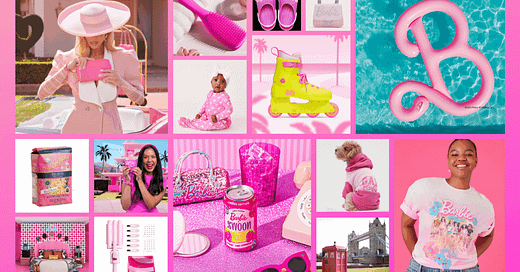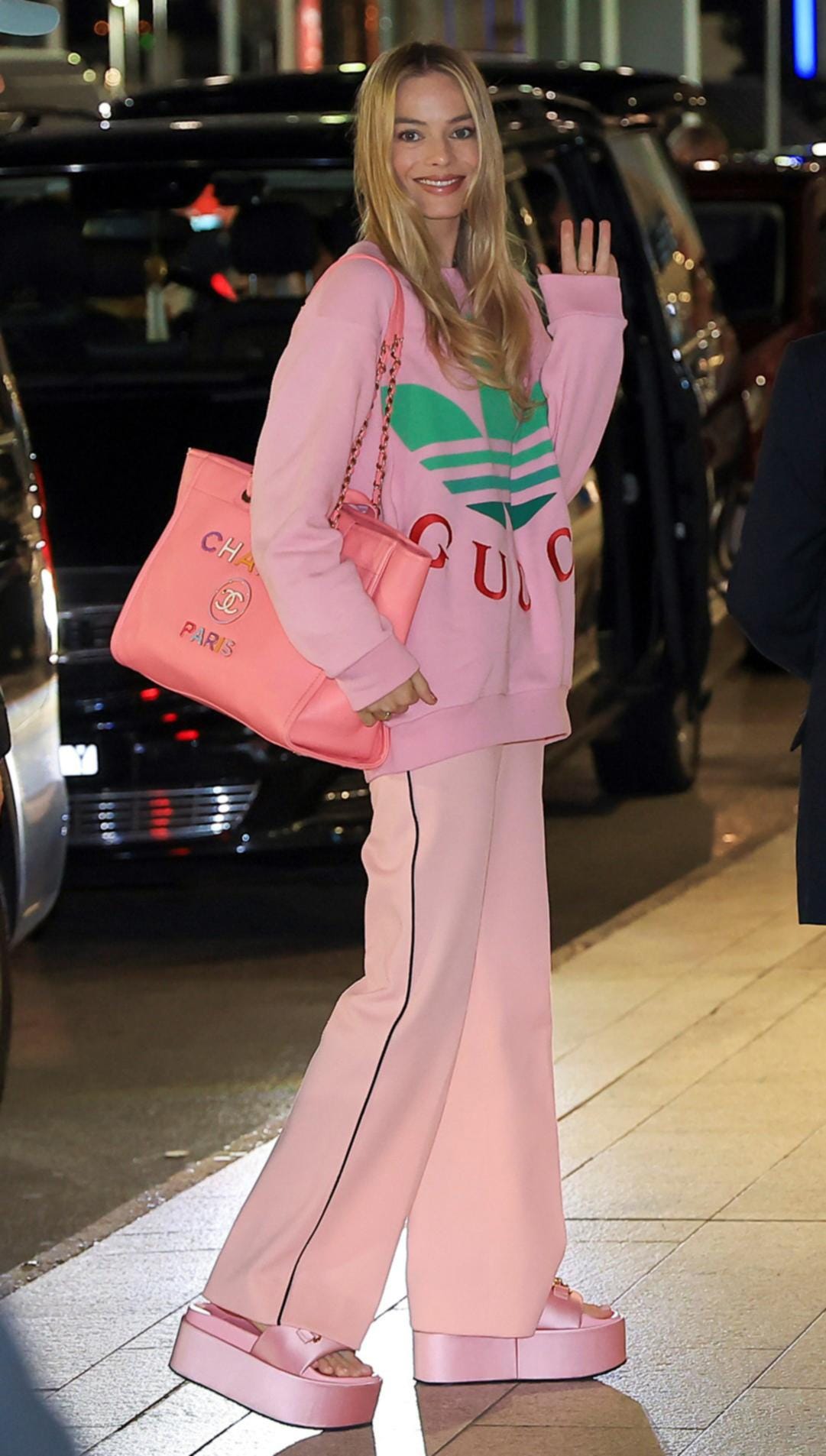Is this the greatest people-free film campaign of all time?
Barbie may have created a model where films aren’t dependent on lead talent, or even talent participation at all, in the promotional phase.
We have PlayStation, ice cream & froyo, Progressive Insurance commercials, an Airbnb Malibu Dream House, Crocs, Gap, Fashion Nova, BooHoo, Bloomingdales, OPI, Alamo Drafthouse, Aldo Shoes, glassware, dinnerware, rollerblades, dog clothing, toothbrushes, a boat cruise, and a burger. I’m easily missing dozens more.
“The scale of this marketing campaign may be unprecedented.”
If you want to spiral on every Barbie brand partnership, product placement, and licensing collab so far, start with Moshe’s iconic Twitter thread here. Then Time here. Then InStyle here.
With Barbie, it even feels like the star is playing second fiddle to the product story.
Instead of ducking from photographers, Margot’s sauntering through airports with ease. She is rested, uncontroversial, and chill. Is this what life looks like when the forced press coverage, fake PR relationships and everything else from the celebrity over-saturation playbook isn’t in your film’s marketing plan? When product and merch take the chaos off your plate?
Maybe the decision to not commodify Margot Robbie within the film marketing was intentionally made in the spirit of the film’s feminist form.
The only real exception to this being her red carpet and press tour fashion, which even then still feels like more of an easter egg game for fans and fashion historians than an exercise in image control. Her commitment to Barbie camp and costume is criminally unserious and has my soul fantasizing about the looks she’d serve if she was playing Minnie Mouse or Marge Simpson instead.
Even her husband pulled out his hot-pink golf hat for the tour.
Time’s Cady Lang talks about this "playful" era of red carpet fashion in a world where most stars may only put enough concerted effort into matching their red carpet hairstyle to their film’s time period.
With her Barbie homages, Robbie isn’t just delivering exquisite looks or compelling marketing for Mattel—she’s also setting a new and incredibly high bar for what the future of the red carpet looks like. Here’s to a new (and far more playful) era of film promotion. (Time)
I, too, could go without ever seeing a smolder or smize again. Less of this:
…and more of this:
I hate that I’m looking at Barbie marketing as a study of who actually has a future in Hollywood.
Studios have spent the last 20 years intentionally buying up the rights to toys, games, already-released films, comic books, and other decades-old IP (intellectual property) that already have established storylines, characters, plots, and fanbases.
Mattel Films announced another 14 movies are planned around their family of toys, which include Hot Wheels, American Girl, Magic 8 Ball, and Thomas The Train. Jason Bateman, Lily Collins, Vin Diesel, L*na D*nham and more have already signed on to either star, produce, write, or direct these projects. If, of course, these projects ever happen. Let me just pause and say that Hollywood is an exercise in getting your money while you can. If solidarity and preservation really existed here, these actors wouldn’t participating in the very franchise model that’s coincidentally causing the industry’s demise.
First, we killed the need for original ideas and stories.
(Yes, Awards Season tends to favor and celebrate original films, but those budgets are only made possible by the tired blockbusters whose box office and merch-on-steroids profits keep studios above the line).
Second, we found a way to rewire the industry to where the re-writing, reimagining, and reinterpretations of existing works and characters became the norm. Work that, whether or not the more self-righteous side of the industry will admit to or not, already lightened the creative load and lowered the contributor stake by at least half.
Third, we proved to studios that it could work. That records could be broken re-telling old stories. That audiences would stick around for the 3rd, 6th, and even 10th installment of even the most tired franchise.
Fourth, we did this long enough for a generational technology, economic, and cultural shift to happen. On the technology front, AI and machine learning now know as much about these franchise IPs as we do—whether it's Barbie and Ken, or Homer and Marge, or Charlie Brown and Lucy.
If AI can squeeze writers completely out, or lower their stake to the same non-existent level that CGI did to model makers and puppeteers, who’ll be left in an industry that’s no longer dependent on original ideas, or even on-camera talent?
Just directors and ….marketers?
Also, blasting this at 10AM…… 💅🏾
















re: Lang’s point about Margot raising the bar for red carpet fashion - i am by no means an expert or historian since the fall of Fashion Police, but I feel like from my own memory bank Zendaya did this with her Spiderman looks?? Dressing to a theme. I’ll have to do my research but i do feel like Z raised the bar first/in general/in that way
As a former model/puppet maker who was replaced by CGI, this Barbie film had already won my heart just because the whole set is practical and fabricated as opposed to be 99% of it being done in front of a green screen. They even had someone hand painting the backdrops as opposed to dropping them in later and you can SEE how much better it looks.